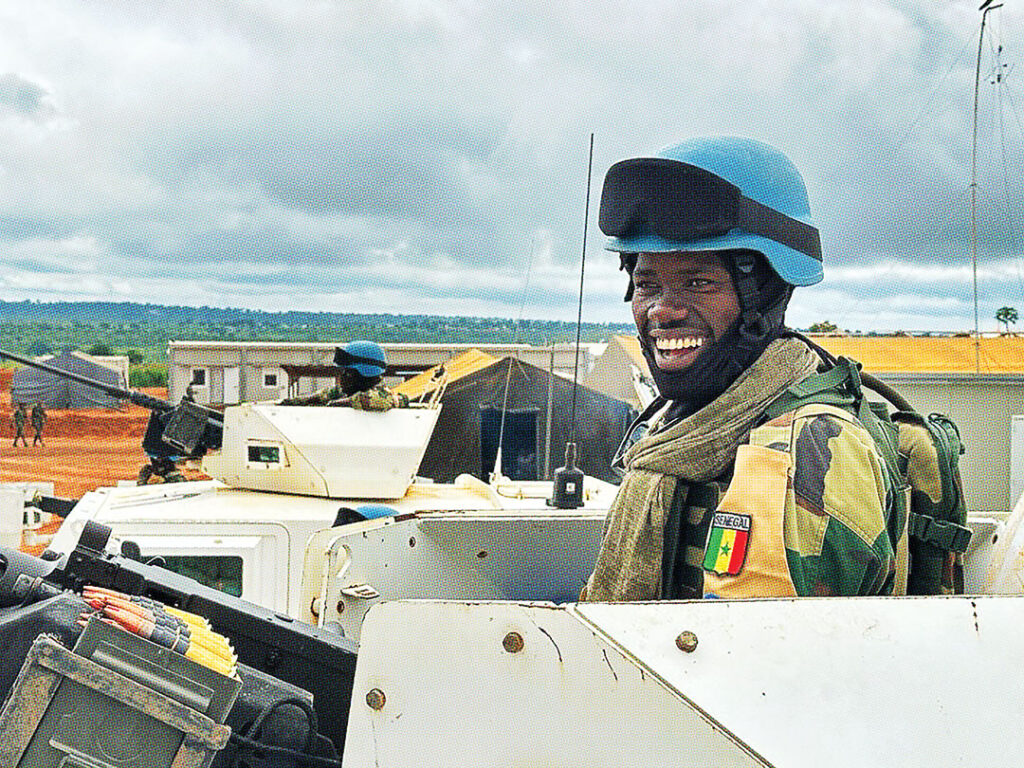ADF STAFF
Spring 2023 was a tense time in Senegal. Protesters packed the streets of Dakar and, in a rare move, the Armed Forces deployed in the capital to maintain order. With tires burning, armored cars on street corners and Soldiers manning barricades, one writer described the country as “sitting on a volcano.”
As a presidential election approached, some on both sides of the political debate wanted the military to take a more active stance. Calls grew louder for them to either support the opposition movement or back then-President Macky Sall and his party.
In a show of defiance, the Senegalese Armed Forces (SAF) said it would not be drawn into the politics roiling the nation. “The General Staff of the Armed Forces invites political actors of all sides and civil society to keep the National Army out of the political debate for the interest of the nation,” read a statement by Col. Moussa Koulibaly, director of information and public relations. “The latter intends to maintain its republican posture and devote itself to its sovereign missions.”
In an interview with Jeune Afrique in June 2023, an unnamed officer said the military would help keep the peace but not deviate from its apolitical stance. “[Deployment in the capital] was necessary to lower the tension, and now it has been lowered,” the officer said. “We want to stay out of the rest of it. Politics might catch up with us, but we hope that doesn’t happen.”
In a region where military coups have proliferated, Senegal is an anomaly. Since independence in 1960, the country has never had a coup. It is among the top troop contributors to United Nations and African-led peacekeeping missions. According to a survey by Afrobarometer, 83% of the population trusts the country’s Armed Forces, the highest percentage among countries polled.
“The Senegalese Army is unique in Africa for its professionalism and for its republican values,” retired French Gen. Bruno Clément-Bollée, who spent much of his career in Africa and now serves as a military consultant for governments, told L’Express. “It’s a republican Army that respects the rules and conforms to the laws.”
How has Senegal achieved this? Experts say it has to do with the country’s unique history and founders who built an enduring model of service to the nation. Observers warn, however, that this tradition is at risk if it is not vigilantly protected.
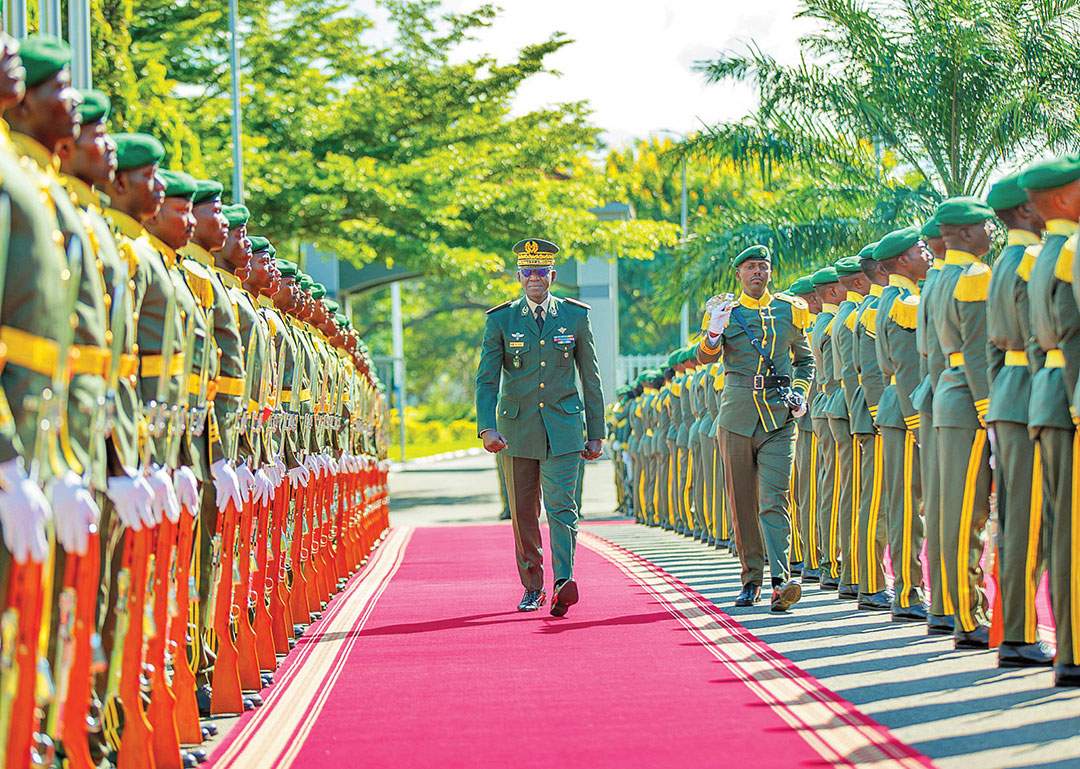
A Partnership of Giants
Senegal’s founding president, Leopold Senghor, is remembered as a pipe-smoking poet and man of peace. Unlike many founding presidents, he envisioned a constitutional democracy and his presidency, although imperfect, laid the foundation for multiparty elections.
In 1962, the young country faced its first political crisis. Prime Minister Mamadou Dia was locked in a power struggle with Senghor. When Dia invoked executive powers and ordered members of the army to barricade the assembly building before a vote, Senghor called it an attempted coup and imprisoned Dia.
Throughout the crisis, Senghor retained the loyalty of the military and had a particularly close working relationship with Gen. Jean-Alfred Diallo, the chief of the Armed Forces.
The partnership proved key. Diallo was an engineer who strongly believed the military should be a force for development. Together the two men created a concept known as “Armée-Nation,” which holds that the military should, first and foremost, serve the population through public works projects and other efforts to improve the day-to-day lives of the Senegalese people.
“They both developed the idea that the army should be a separate actor in economic and social development, and that it should participate in the construction of the country,” said historian Romain Tiquet, who studies West Africa.
The concept was put into action in 1964 with a pilot project in the village of Savoigne, where Soldiers and young national service conscripts helped build a bridge, roads, wells and buildings and prepared the land for agriculture. It has continued throughout the country’s history. In 1968, Senegal established a military medical school to train doctors who could respond to disease outbreaks such as cholera and yellow fever. In 1999, the country created a committee through which military leaders could meet with members of parliament, government agencies, civil society and the private sector to decide which infrastructure projects to pursue.
The Armée-Nation model oriented the military toward what is often called “human security,” wrote Brig. Gen. Ousmane Kane, former air force chief. “The participation of ‘men in uniform,’ in the development missions created a strong bond with the people whose defense and security are the reasons to serve in the Armed Forces,” Kane wrote.
Today, the concept is deeply ingrained in the SAF. Each year branches of the Armed Forces undertake projects ranging from agricultural work to building schoolhouses to public infrastructure and environmental preservation. The military opens its medical facilities to civilians and holds public health events. The military is not the first responder to national disasters, but it typically supports civilian agencies.
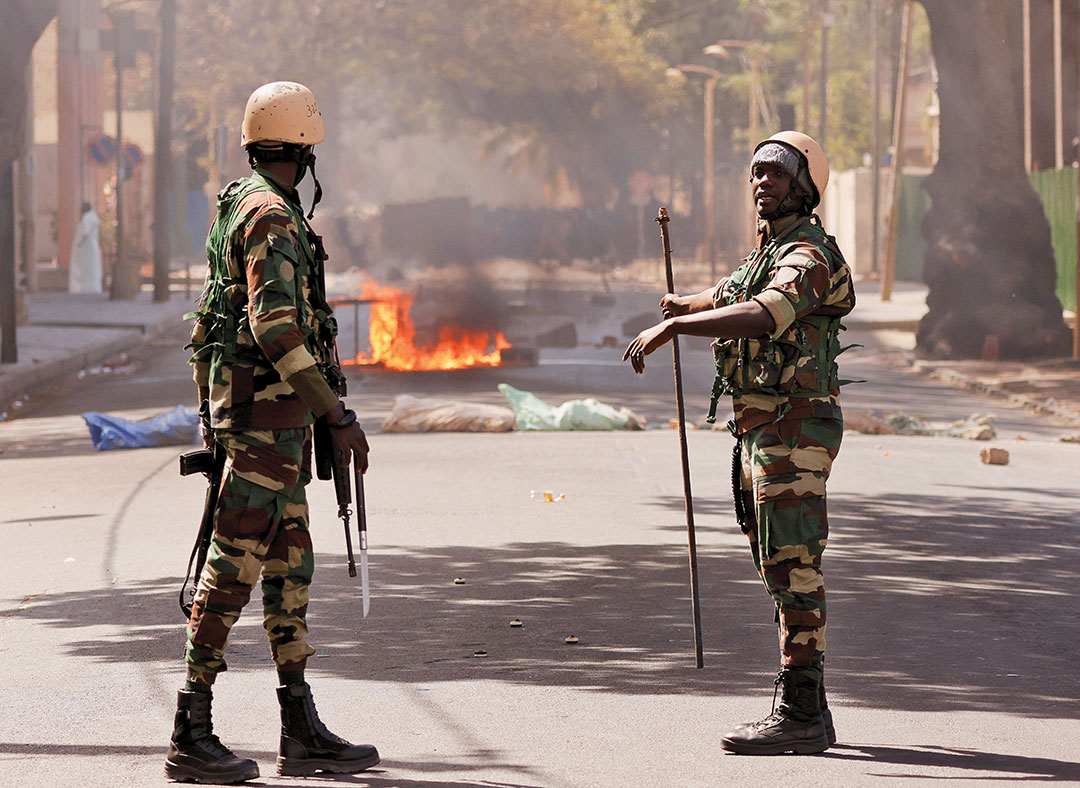
Education as the Foundation
An emphasis on military education dates to the founding of the SAF. In 1962, Senghor and Diallo increased educational investment to nearly 30% of the army budget. “This professionalized focus helped establish a ‘military enclave’ which has made it a strong component of Senegalese development,” wrote U.S. Air Force Lt. Col. Jahara Matisek, a professor at the U.S. Naval War College.
Today, Senegal offers a variety of professional military education opportunities from the academy up to the command and staff college levels. Its military academy, the École nationale des officiers d’active, was established in 1981 and admits about 100 cadets each year for two years of training. Senegal established the Centre des Hautes Études de Défense et de Sécurité for advanced defense and security studies in 2013 and offers master’s degrees in defense, peace, security and national security. In 2020, the country opened the Institut de Défense du Sénégal, which has a command and staff college and a doctrine development center.
Retired Gen. Talla Niang, former deputy chief of staff of the Armed Forces of Senegal, said officers typically receive five to six years of education after high school. The education continues throughout their careers.
“In the Senegalese Army, you’re always educated and trained for a particular job before you’re sent to do that job,” Niang told the Africa Center for Strategic Studies (ACSS). “That way, you know how to do your job.”
Senegal does not yet have a war college, and domestic military education capacity is limited. Matisek, who has spent years studying the country’s military by interacting with Senegalese officers, said he found that they had received training from all over the world, making it “hard to get consistency across the force.”
“They still somewhat rely on other countries and institutions to provide a lot of education and training. So, there is a cobbling together of different doctrines,” Matisek, who said his comments do not necessarily reflect the views of the U.S. government, told ADF. “They need more capacity at their academy, mid-level staff college and help building a war college so the majority of their force is domestically trained.”
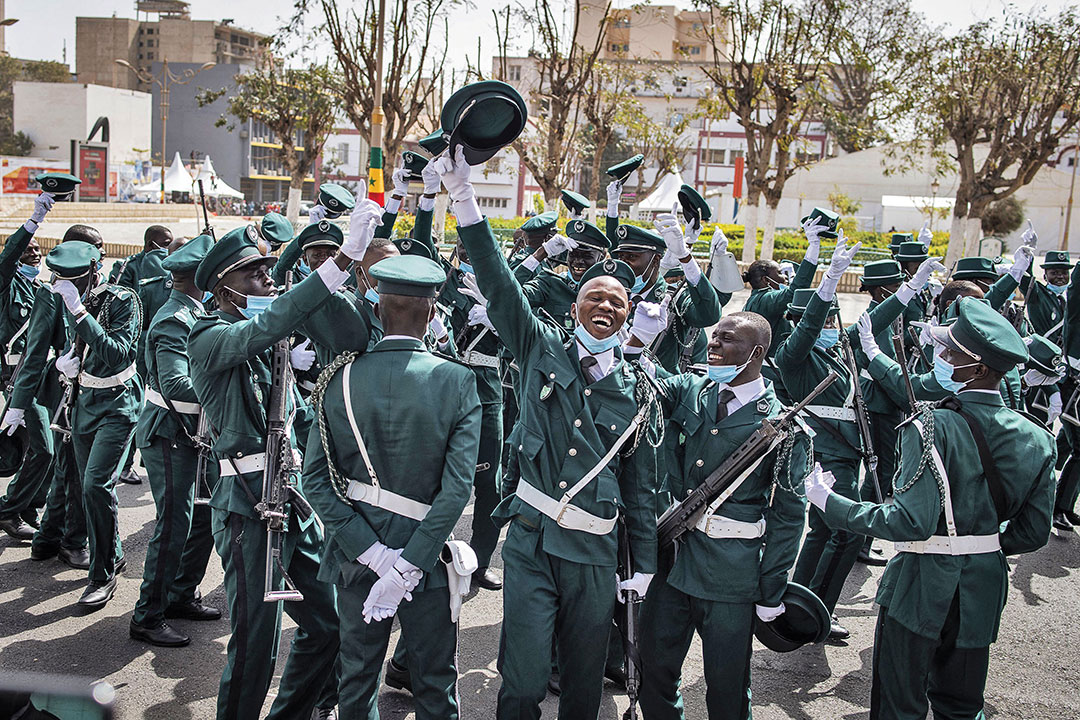
AFP/GETTY IMAGES
Strength in Diversity
Many national militaries do not reflect the countries they serve. Often, the upper ranks are filled with members of one ethnic or religious group with ties to the president. This imbalance leads to resentment and can be a motivating factor for coups.
Senegal has worked to avoid that. The country is majority Muslim but boasts an ethnic diversity including Wolof, Fula, Serer, Mandinka and others. The military recruits from all groups.
“Its troops mirror the country’s ethnic and regional composition. There is a key or registry that shows this composition,” Niang told ACSS. “So, if we say that this ethnic group represents 2% of the population, we will find those 2% in the Army. The Senegalese Army, therefore, is like a microcosm of Senegal itself.”
Similarly, Senegal has never created a permanent presidential guard. In countries with dysfunctional militaries, these units are filled with soldiers loyal to the president and are used as a mechanism to maintain power and quash dissent. In Senegal, members of the gendarmerie are assigned to guard the president and rotated out every two to three years.
“That means that those who guard the President — he doesn’t choose them, he doesn’t know them. The Presidency is an institution. The president does not choose the head of the presidential guard,” Niang told ACSS. “The presidential guard cannot launch a coup in Senegal, they are less equipped, do not have sufficient numbers, and aren’t strong enough.”
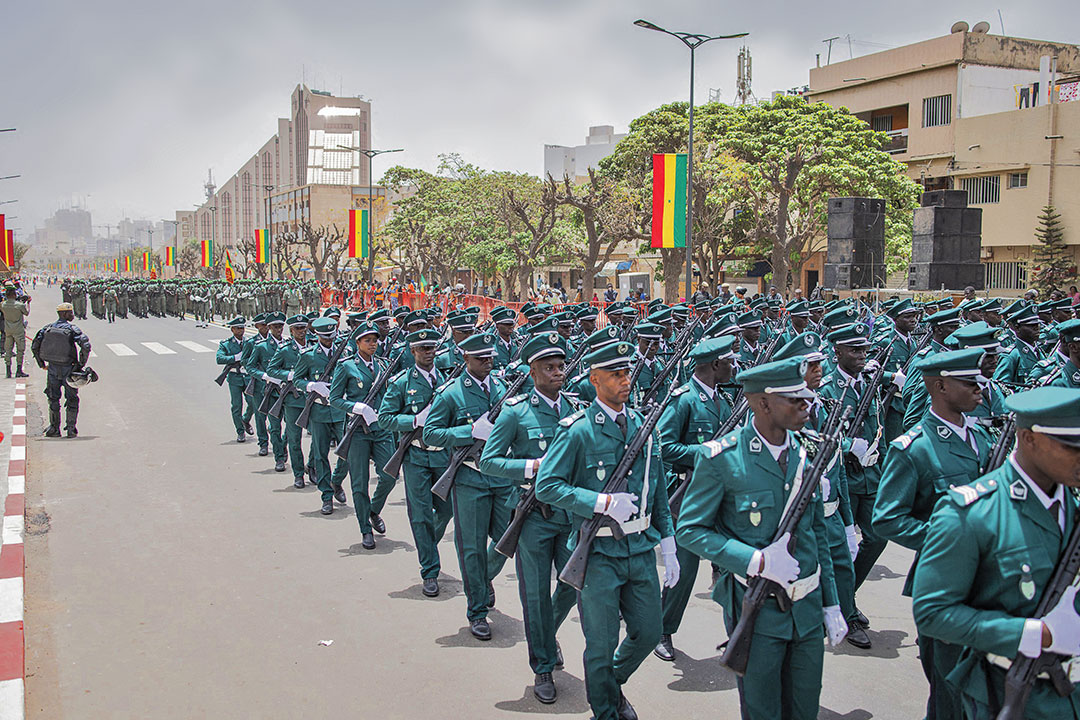
AFP/GETTY IMAGES
Merit-Based Promotion
Few things harm morale and effectiveness more than promotions based on cronyism or ethnic preferences. Senegal has promotion boards at every level of its Armed Forces that evaluate a candidate’s qualification for advancement. Senegal’s army maintains a balance of 5% officers, 15% noncommissioned officers and 80% enlisted Soldiers. The country also has avoided bloating the upper ranks of its Armed Forces with officers who advance due to favoritism.
The country’s leadership believes that meritocracy is essential to building a high-performing military. “If you’re promoted on the basis of personal relationships, you may have the rank and the position, but you won’t be accepted or legitimate in the eyes of your peers nor your subordinates. And you won’t be able to give orders to your people so that they execute them without hesitating or complaining,” Gen. Birame Diop, Senegal’s minister of Armed Forces, told ACSS. “Under a merit-based system, not everyone will always agree with you, but you will have the legitimacy and credibility needed to exercise authority over those you lead.”
During his time studying the Senegalese army, Matisek found that units emphasize leadership traits through an informal system known as “djobot.” This dynamic, which roughly translates to “familial relations,” means that Soldiers who exhibit leadership are treated as older brothers or even father figures. This self-identified leadership quality can lead to promotion on a formal level. It also means units are self-policing with a culture of high standards and professionalism.
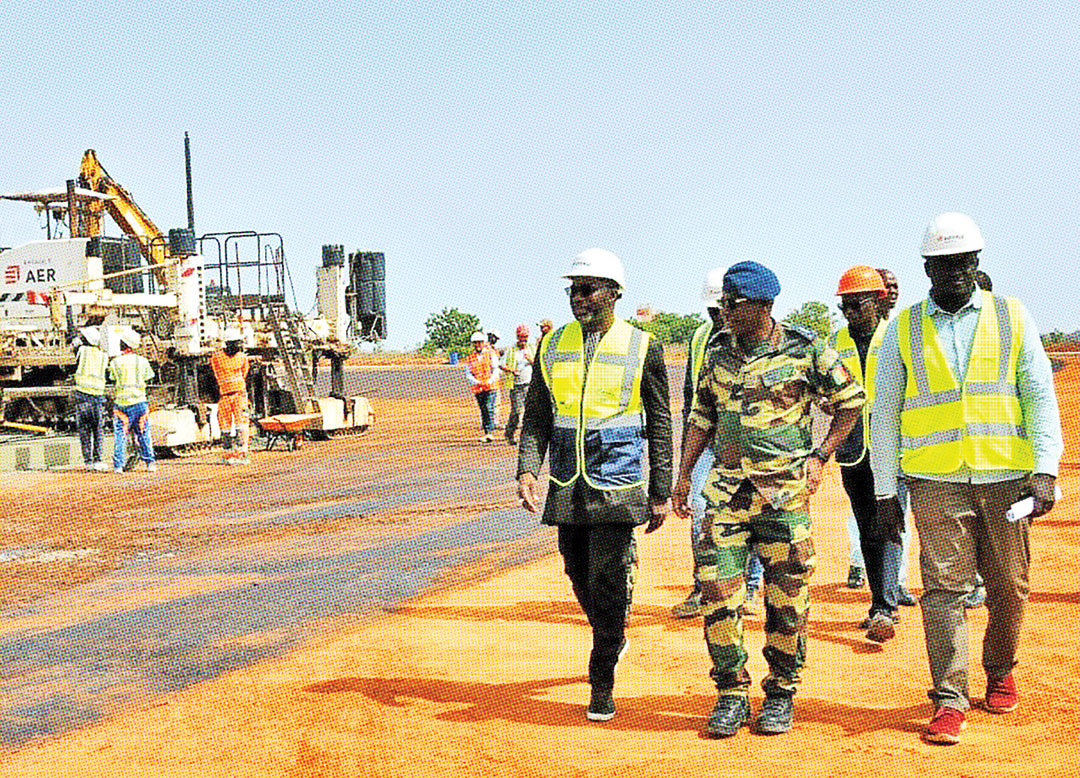
“It’s the informal element of someone being respected and viewed as a good leader who takes care of their troops,” he said. “Perception is reality. The djobot is used to describe how they assess you for your merit.”
As Matisek interacted with Soldiers at all levels of the SAF, he repeatedly heard that professionalism and dedication to republican values were a source of pride and carefully protected. He believes this has helped insulate the country from the coup contagion sweeping the continent. “They take it so seriously with regards to ‘We’ve never had a coup and we’re going to keep it that way,’” Matisek told ADF. “They said, ‘There’s lots of things that we do informally amongst ourselves to make sure that we’re all in agreement about ensuring that we keep the republican tradition of noninterference in domestic politics.’”
Former Soldiers know this tradition must be protected. As election day approached in February 2024, retired paratrooper Col. Seyni Cissé Diop published a newspaper editorial titled “Que Nenni!” or “I think not!” In it, he compared the Senegalese military to the mythical Greek figure Odysseus who ties himself to the mast of a ship to avoid being tempted by the siren song. Coups and political corruption, Diop said, are the siren song leading African militaries astray. He urged his fellow Soldiers to remember their proud tradition.
“You are the inheritors of traditions of loyalty to the republic,” Diop wrote. “You and your institution will survive this political crisis, whatever the cause, if you remain faithful to the spirit of your elders who understood how to guard their dignity as incorruptible Soldiers.”

